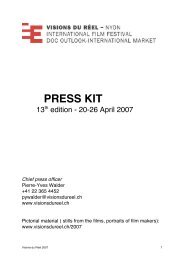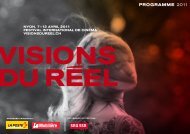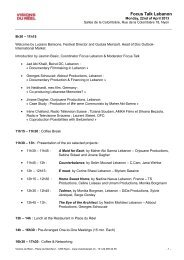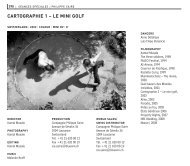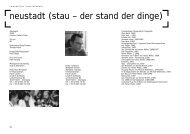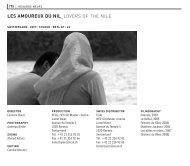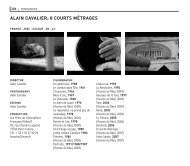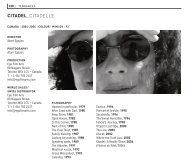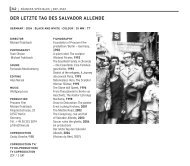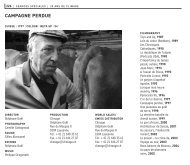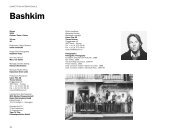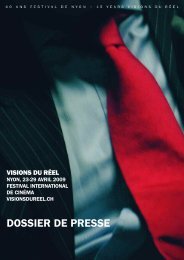Katalog 2013.pdf - Visions du Réel
Katalog 2013.pdf - Visions du Réel
Katalog 2013.pdf - Visions du Réel
Create successful ePaper yourself
Turn your PDF publications into a flip-book with our unique Google optimized e-Paper software.
atelier – laila pakalnina<br />
181<br />
picas<br />
there, camera on the tripod and waiting<br />
for insects and animals to show up.<br />
Actually after this film I started feeling<br />
confident in filming human beings: I’m<br />
prepared to wait. We’ve been filming for<br />
almost two years and, once I started editing,<br />
immediately came the question of<br />
the music. I usually don’t use music, but I<br />
realized quite soon that I actually needed<br />
it with this film. So, I was at the Venice<br />
Film Festival in 2003 with my film Pitons<br />
(The Python) and there I met Shigeru<br />
Umebayashi who, among many other<br />
things, composed the music for Wong<br />
Kar-wai’s In The Mood for Love and who<br />
is very famous. But I didn’t know who he<br />
was when I met him; I just met a composer<br />
from Japan. We exchanged cards<br />
and he gave me a CD with his music. A<br />
few months later I listened to the CD, discovered<br />
his wonderful music and asked<br />
the pro<strong>du</strong>cer to sign him for Leiputrija.<br />
Only after that, out of curiosity, I Googled<br />
his name and realized how famous he<br />
was and what he did. The fact that he<br />
accepted to compose the soundtrack of<br />
Leiputrija, despite the ridiculously little<br />
money we could afford to pay him, is like<br />
a fairy tale to me. We sent him the final<br />
edit and I remember the moment when<br />
we received the music as a very moving<br />
one: everything was just perfect. That’s<br />
actually my first and almost only experience<br />
with composed soundtracks. The<br />
second one was with Picas (Pizzas) even<br />
if it was completely different, because<br />
when you think about music you probably<br />
don’t think about the hip-hop you<br />
find in Picas. But that was exactly what<br />
I needed for the film. It’s the poetry of<br />
this generation. I can’t say that poetry is<br />
dead, but 20 years ago people were still<br />
reading poetry and now, for many people,<br />
that is the way in which they exchange<br />
their feelings about life.<br />
I would like to go from Leiputrija to<br />
Par Dzimteniti (Three Men and a Fish<br />
Pond), which looks like a “zoom-out”<br />
from the <strong>du</strong>mpsite in order to include<br />
human beings. What is the relationship<br />
between these two films<br />
The films are absolutely related in many<br />
ways, starting from the presence of<br />
Maris as a cameraman: it is the same<br />
kind of filming approach, the same<br />
observation and the same waiting for<br />
things to happen. It’s actually the location<br />
itself which gave us the possibility<br />
to see human beings living at the same<br />
rhythm of all the other beings which<br />
surrounded us. Looking at nature, and<br />
human beings as part of it, definitely<br />
helps in understanding ourselves better.<br />
And yes, it’s also very important to smile<br />
a bit at ourselves.<br />
That is a feeling which I think we can<br />
find throughout all your filmography. It<br />
seems that, in a very tender way, you<br />
systematically point out the clumsiness<br />
of humans and often the smile<br />
comes from the way your characters<br />
move. Actually in your films, both fiction<br />
and documentaries, we can find a<br />
pretty exhaustive inventory of means<br />
of transport: boats, bikes, cars, trucks,<br />
trains, buses, mopeds… Where does<br />
this fascination come from<br />
Well, it’s difficult to answer, but it’s<br />
probably not by coincidence that the<br />
very first film by the Lumière brothers<br />
was on a train. And I can guess that<br />
they chose that subject because it was<br />
moving. I think that is the same reason<br />
for which we can find so many means<br />
of transport in my films, and also<br />
because they are not just moving, but<br />
carrying people, carrying us, from one<br />
point to another. One of my future films<br />
could actually be on a means of transport<br />
again. The pro<strong>du</strong>cers of Autobuss<br />
asked me to make Autobuss 2, in order<br />
to capture all the changes which have<br />
occurred from the time we filmed. I<br />
didn’t want to make another film about<br />
a bus and he said: “OK, let’s make<br />
one about planes then”. So I started<br />
thinking about this peculiar route by<br />
Uzbekistan airways, which goes from<br />
Tashkent to New York via Riga. I don’t<br />
know if and when I will do it, but I can<br />
feel that there is a film there, and it<br />
would be again a film focusing on a<br />
means of transport.<br />
It strikes me in a way when you say<br />
“there is a film there”, as happened<br />
for your last film Chimney. I somehow<br />
have the impression that you are constantly<br />
open to receiving inspirations<br />
and that you actually manage to realize<br />
all your projects. Have you ever been<br />
forced to abandon a project Have<br />
you ever experienced frustration like, I<br />
guess, most of your colleagues<br />
Well, I think that if “there is a film” then<br />
you can make it. I come from a country<br />
where there is very little money for films,<br />
especially for the kind of films I do. But<br />
at the same time I can say that the most<br />
important thing is to have an idea, which<br />
triggers the desire to make a film. If you<br />
have that, you can do it. That doesn’t<br />
mean I want people to work for free,<br />
but probably that’s one of the reasons<br />
for which in my filmography I have more<br />
documentaries than fiction. My films are<br />
cheap. The last film for example: the<br />
crew is composed of the cameraman,<br />
a sound operator who is also sound<br />
director, an editor and I’m pro<strong>du</strong>cing it.<br />
Filmmaking for me is not an “alibi” to<br />
remain seated on one idea for ten years.<br />
You might need a few years in order to<br />
realize one, but for most ideas you just<br />
need to do something with them as<br />
soon as you can, because you change<br />
constantly and you will most probably<br />
start to feel the need to go towards your<br />
next idea.



